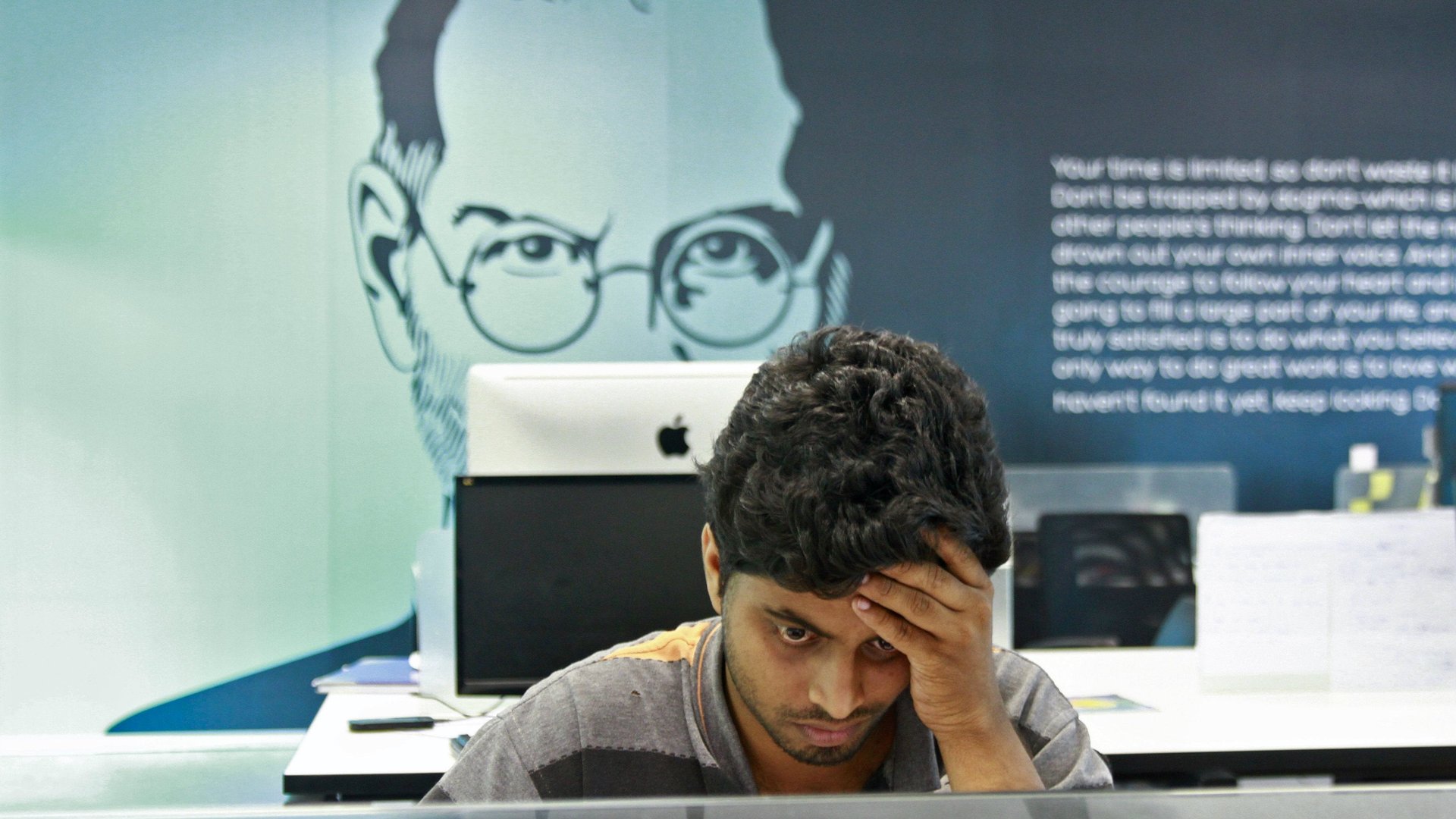Silicon Valley has idolized Steve Jobs for decades—and it’s finally paying the price
Steve Jobs has been called the greatest businessman the world has ever seen and the best CEO of this generation.


Steve Jobs has been called the greatest businessman the world has ever seen and the best CEO of this generation.
But he’s also the same man who would allegedly yell at people for 30 minutes straight, cut in front of his employees at lunchtime, berate hospitality and restaurant staff, park in handicapped spaces, said all HR personnel have a “mediocre mentality,” and told his staff how much they “sucked.”
Whether it’s the 19th-century railroad industrialist George Pullman or Mr. Spacely from The Jetsons, CEOs have always been a surly bunch. But in recent years, it seems that being an asshole has become an aspirational trait.
It’s no wonder. Walter Isaacson’s biography Steve Jobs didn’t just create a Hollywood hit: It created a manual for any bosses seeking a hall pass for their temper tantrums. Along with recounting Jobs’s blistering behavior and his “perverse eagerness” for putting people down, Isaacson remarks that “people who were not crushed ended up being stronger” and that those employees who were most abused by Jobs ended up accomplishing things “they never dreamed possible” thanks to his harsh treatment.
In other words, it’s okay to tell your employees that their work is shit and to park your Mercedes across two handicapped parking spaces—as long as the end result is a successful product.
No wonder we now have people like Uber CEO Travis Kalanick and Amazon CEO Jeff Bezos making numerous headlines for their tempestuous behavior. Several Uber executives have left the company, while investors have publicly criticized Kalanick, saying that there are “toxic patterns” in the Uber workplace. Meanwhile, Amazon has a reputation for being a “bruising workplace,” the kind of office where people regularly break down at their desks, and where grown men leave the conference room with their faces covered to hide their tears.
Somewhere along the way, it seems that Silicon Valley decided that internet connectivity matters more than human connectivity; that a surfeit of technical intelligence can make up for a dearth of emotional intelligence. After all, if it worked for a genius like Jobs, it can’t be that bad.
Except it is. While this management style might work in the short-term, employees can’t flourish for long under a narcissistic, demanding boss. As recounted in the Isaacson’s biography, Jobs’s acid tongue eventually caused his employees to burn out. After working 10 months of 90-hour workweeks, one employee finally quit in exasperation after Jobs walked into the room and told everyone how “unimpressed” he was with what they were doing. Apple co-founder Steve Wozniak said “some of the most creative people in Apple who worked on the Macintosh” left the company and refused to ever again work for Jobs again. Because of Jobs’ nasty temper, Apple lost out on impressive talent.
New research bears out these experiences. Studies have shown that hyper-critical leadership not only leads to unmotivated employees and office in-fighting but can also lead to serious issues like depression, high blood pressure, weight gain, substance abuse, and even premature death.
But can we really blame Jobs for this legacy of emotionally lethal (and perhaps literally lethal) work environments?
“Managers who try to emulate Mr. Jobs by just being rude or aggressive are missing the point,” Issacson says. “Mr. Jobs was striving for perfection.” But within this justification lies the problem. Of course Jobs wanted perfection—all CEOs do. But why is bullying considered an effective, let alone acceptable, way to motivate your team to perfection? Jobs was famous for the way he would obliterate his staff, often in public, which maximized their humiliation by making it a spectacle rather than a private affair. Are we to believe that shaming employees is what made Apple great?
Recent research on shame and the devastating impact it can have on a person’s motivation, creativity, and behavior would say otherwise. Shame has been linked to depression, alcoholism, obesity, violence, and even recidivism in inmates. As author and shame researcher Brené Brown says, “Shame corrodes the very part of us that believes we are capable of change.”
It’s simple: The worse we feel about ourselves as people, the less we are able to make good choices and perform to our highest potential. Making your employees feel terrible about themselves isn’t just an ineffective leadership tool: It’s also just plain lazy. It takes no special skill to scream at someone, and it’s easy to lash out when you are angry or disappointed. But to lead with dignity, composure, kindness, and self-awareness? That takes effort. That takes maturity. And it doesn’t come naturally to most of us.
Whether or not it comes easily, emotional intelligence ought to be the foremost requirement for our companies’ leaders. These skills can be taught, CEOs can change, and we can demand better. A boss in Silicon Valley who isn’t an asshole? Now that would be “thinking different.”
Learn how to write for Quartz Ideas. We welcome your comments at [email protected].
____________________________________________________________________________